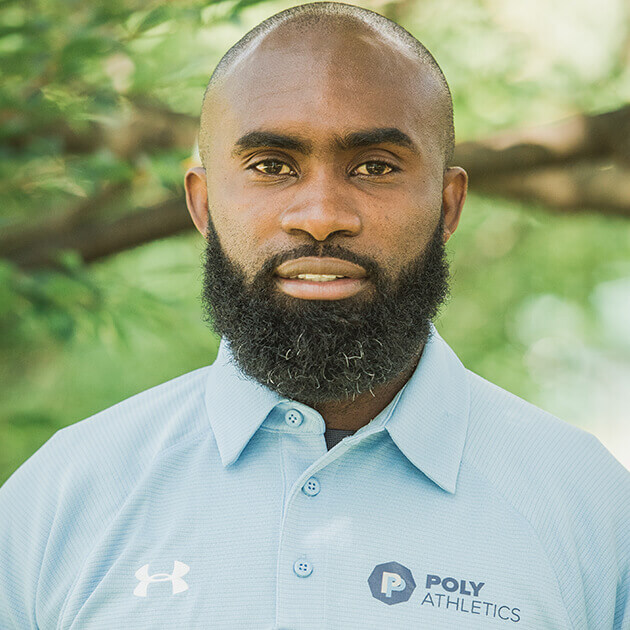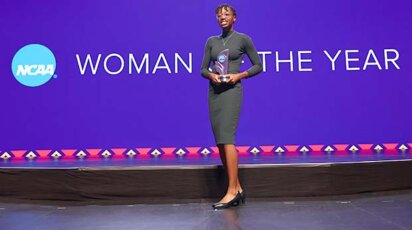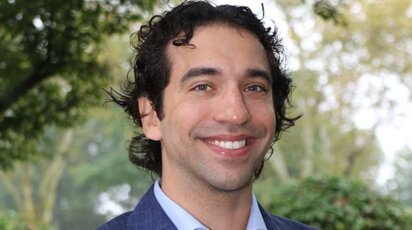News
Poly on Film Features Rob Maylor ’96, Producer of “Sprinter”
The Poly community shared a discussion on Sprinter, a film co-written and produced by Rob Maylor ’96, in the fourth installment of the Poly on Film series on February 25. Maylor was joined on a panel by Poly’s Director of Performance Fitness Richard James, Head of Athletics Richard Corso, and alumna Keyonte “Kiki” Sutherland ’03, P’26.

Maylor is the chief executive officer and founder of Mental Telepathy Pictures, an independent production company focusing on new narratives about the Caribbean and its diaspora. Sprinter, directed by Storm Saulter, is their first production. The film won three awards—Best Feature, Audience Award and Best Director—at the 2018 American Black Film Festival.
Sprinter tells the story of Akeem Sharp, a high school track and field sensation in Jamaica. He hopes that success as a runner will take him to the U.S. where his mother, who has supported the family while living as an illegal resident for over a decade, lives in Los Angeles. But first he has to overcome turmoil at home and the influence of a brother, Germaine, who is a scam artist, and learn how to treat women with respect. Fortunately for Akeem, his coach provides guidance, telling him to wear “mental blinkers” and to focus on his goals. The film stars David Allen Grier, Lorraine Toussaint, and Dale Elliot and is available on Netflix.

Director of Arts Outreach Robert Aberlin ’62, P’00, ’03 hosted the discussion and welcomed the panelists. Aberlin began by asking Maylor about the trajectory of his career and whether he was interested in film during his Poly days. As a matter of fact, Maylor said, he wrote his senior thesis or senior plan about the films of Brooklyn. Maylor’s parents, who came from Jamaica, wanted him to be a barrister. One of Maylor’s first jobs was with lawyer Johnnie Cochran. He went to William and Mary and wanted to study entertainment law. He moved to San Francisco for a job with a clothing line and then applied to USC and got a job at Magnolia Pictures. “I wanted to be a storyteller,” he said. “You should tell the story you are most qualified to tell.”
Maylor said, “The hardest thing in the industry is to get people to read your script.” Fortunately, the script got in the hands of Will Smith and Jada Pinkett Smith, who were very enthusiastic and became producers of Sprinter. Maylor said that the story is universal—this boy was without his mother.
Panelists Share Their Reactions to the Film

Aberlin asked Coach Richard James, who represented Jamaica at the 2004 Summer Olympic Games in Athens, Greece, to talk about his own experience in Jamaica. James shared that he first saw Sprinter while he was working with a Nigerian team and was so moved by the film, it brought him to tears. He said it reminded him, “How much we as Black people have to work on a different level.” He said it brought back feelings of anger, disappointment, and grief, but “opens up the door for how we view race.” He said he had a feeling of having to “prove myself to be worthy of this space.”
In advance of the panel, James said, “I absolutely loved the movie as it highlighted the struggles of how immigration affects families. We can clearly see that the desire to reach the USA caused the splitting of a family. I can identify with Akeem as the young athlete who wanted to escape the chaotic world of Jamaica. I can identify with the high levels of confusion as we seek to find self.”
“Life is a storm and [young athletes] should find the right people to guide them through the storm.”
James said young athletes should take this from the film: “Life is a storm and [young athletes] should find the right people to guide them through the storm.” Like Akeem, James had a coach who believed in him. “Coach Oral Dunston is the coach who identified and groomed my talent,” he said. “Had it not been for him and his encouragement, the story of my life would have been different. His words were like water to the desert.”
Aberlin asked Keyonte “Kiki” Sutherland ’03, P’26, who is an Associate at Elefterakis, Elefterakis & Panek, what her life trajectory had been. Sutherland said her parents had come to the U.S. from St. Vincent to go to college. She recalls her family having boxes of supplies to send back to family in St. Vincent. “It was a big part of our culture’” she said. She was surrounded by strong women, she said. “They held me to a high standard.”

“Being a young athlete takes patience, confidence, and most important dedication,” Sutherland said in advance of the panel. “At times it was difficult to watch my friends hanging out, while I was at practice, and it could sometimes feel like I was ‘missing out’ on some memorable moments. I can remember constantly struggling with wanting to work harder on the field or the track, but also wanting more time to myself to explore other interests. I ended up not participating in any athletics during my freshman year at college, but the urge to get back on the track led me back to my team.”
“Having teachers and coaches that constantly pushed me to be better and do better and that I knew would always catch me if I happened to fall made all the difference in my life.”
Sutherland shared memories of her Poly coach. “I will never forget my very first 400-meter race. I was a freshman and Coach [Bart] Moroney said something along the lines of, ‘Kiki you are going to run the 400-meter dash. It’s just one lap around the track. Just follow Raquel (a senior at the time) and push through that last 100-meters of the race.’ What he forgot to tell me was that by the time I hit the 300-meter mark I would be in excruciating pain almost wanting to collapse and quit, but to be honest I probably would have faked a stomach ache if he did. Coach Moroney made me feel like it was possible to do and be successful at any event and I would often go to him for advice and support on and off of the track. We kept in touch well after my graduation from Poly and he was always one of the first people I searched for when I returned. Having teachers and coaches that constantly pushed me to be better and do better and that I knew would always catch me if I happened to fall made all the difference in my life.”
“As a student athlete I had to learn how to manage my time,” Sutherland said. “I think being a student athlete gave me a focus that carried me from Poly to law school and beyond.”

Aberlin asked Charles Polizano P’18, Head of Technology, to share a clip from the film. It was the scene where Akeem’s coach tells him he has to wear “mental blinkers.” He counseled, “There is no shortcut, not in track and field, not in life—mental blinkers!” Aberlin asked Maylor if he needed mental blinkers to finish the film. “Yes, I had to be singularly focused. From 2016 to 2018 there was not much else that I thought about.”
Corso, who has coached Olympic water polo teams, said, “This film really struck a chord.” He said it showed what can happen to kids “when you give young student-athletes an opportunity.”
Maylor said it was important to show a “working class Jamaican family.” Earlier, Maylor had explained, “I am the first generation in America of Jamaican immigrants. Every summer and break from Poly, I found myself back in the country of my parents and it was not a home-away-from-home, it was home for me. My parents have always split time between the island and New York and are now retired here in Jamaica. As an adult, my dad and I would regularly attend CHAMPS, the annual Jamaican high school track meet whose competitive atmosphere rivals the Super Bowl or NCAA March Madness. When writer/director Storm Saulter shared his vision for Sprinter, I knew it was a story I was uniquely qualified to help tell and bring to audiences around the world.”
Aberlin noted the strong women characters in the film. “That’s nothing new to me,” Sutherland said. Women in the culture see opportunities to support their families and have to take them, the way Akeem’s mother did. “This is so deeply rooted in the fabric of the culture,” she said. “It’s a story that needed to be told.”
“Every woman is portrayed in a positive light,” added Maylor. James noted that Jamaica has many women runners. He said his mother and grandmother were strong women who “exposed him to what college is” and kept him on a straight path. “Watching the movie, I see the strength of women.”
A film clip screened showed Akeem suffering an ankle injury while escaping from the scammers. Maylor noted that the scene was shot with a stunt double. Even though the scammers wave guns, Maylor said, “Not a single shot gets fired” in the film.
Another film clip shows Akeem’s mother meeting up with him when he is with his fellow athletes heading to competition. She just wants to touch his face. “Why did you leave me?” Akeem asks her. “I did what I did so you could be here today,” she responds.
Aberlin asked Maylor what is next for him. Maylor said he is working to develop a soundstage in Jamaica. He said a Sprinter TV series might be a possibility. “There is a lot more story to be told,” he said.
“Observe the world around you with an open mind…”
Maylor shared advice for young Poly filmmakers. “Read, journal, and observe. Read a variety of scripts and books to understand how other people tell stories and learn about worlds foreign and familiar to you. With books and movies, journal what works or doesn’t work for you, what elicits an emotional response, and why you think this happens. Observe the world around you with an open mind… Cinema is a language of its own and only by engaging with it on its own terms are you able to become a practitioner.”
The next Poly on Film discussion event is The War and Peace of Tim O’Brien directed by Aaron Matthews ’89 on April 21. The documentary will be available soon on Amazon.
Please follow PolyArts on Instagram for all the latest and greatest highlights from Poly’s amazing Arts program.



